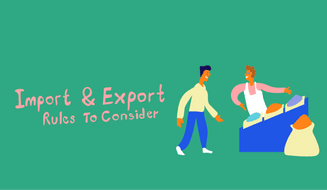- Osome Blog HK
- All You Need To Know To Start a Trading Company in Hong Kong
All You Need To Know To Start a Trading Company in Hong Kong
- Modified: 5 May 2025
- 9 min read
- Incorporation


Gabi Bellairs-Lombard
Author
Gabi creates content that inspires. She's spent her career writing compelling website copy, and now she specialises in product marketing copy. As the voice of our products and features, Gabi makes complex business finance and accounting topics easy to understand. Her top priority is ensuring that her words impact and inspire her readers.
Hong Kong is a bustling city known for its international trade and business opportunities. If you're considering starting a trading company in this vibrant metropolis, you've come to the right place!
In this article, we'll cover all the key information you need to know to get your business up and running smoothly. So, let's dive in and explore the world of trading companies in Hong Kong!
What Is a Trading Company?
A trading company, as the name suggests, is an entity that engages in the buying and selling of goods. It acts as an intermediary between manufacturers and customers, facilitating the exchange of goods on a local or international scale. Trading companies serve as a link in the supply chain, enabling the smooth flow of products from producers to end consumers.
These companies play a significant role in Hong Kong's thriving economy, thanks to the city's strategic location and business-friendly environment. Operating a trading company in Hong Kong can open doors to vast opportunities and connect you to global markets.
Let's delve deeper into the world of trading companies and explore the various aspects that make them crucial players in the global economy.
One of the primary functions of a trading company is to identify and source products from manufacturers. They carefully select suppliers based on quality, price, and reliability. This process involves extensive research, market analysis, and negotiation skills to ensure they procure goods that meet the demands and expectations of their customers.
Once the trading company has established a reliable network of suppliers, they focus on marketing and promoting the products to potential customers. This involves creating effective marketing strategies, conducting market research, and building strong relationships with buyers. By understanding consumer preferences and market trends, trading companies can position themselves as trusted sources for specific products.
Furthermore, trading companies often provide additional services to enhance the value of the products they offer. These services can include product customisation, packaging design, quality control inspections, and logistics management. By providing these value-added services, trading companies differentiate themselves from competitors and cater to the specific needs of their customers.
As the world becomes increasingly interconnected, trading companies play a vital role in facilitating global trade. They bridge the gap between manufacturers and customers, ensuring the efficient distribution of goods across borders. By leveraging their expertise in international trade regulations, logistics, and market knowledge, trading companies contribute to the growth and development of the global economy.
3 Main Types of Trading Companies in Hong Kong
When starting a trading company in Hong Kong, it's essential to understand the different types available. Here are the three main categories:
1 Consulting
Consulting trading companies in Hong Kong are firms that specialise in providing advice to businesses about the purchase and sale of goods. They have extensive knowledge of markets and trends, and they use this expertise to guide their clients' trading decisions. These firms can provide advice on the best products to trade, the most favorable markets to enter, and the most effective strategies to use. Their insights can be invaluable for companies that are new to the trading business or for companies looking to expand their trading operations.
2 Manufacturing
Manufacturing trading companies are involved in the production of goods for sale. They source raw materials, oversee the manufacturing process, and handle the sale and distribution of finished products. These firms typically have factories or production facilities, either in Hong Kong or overseas. Manufacturing trading companies are common in industries such as electronics, textiles, and consumer goods. They can offer significant cost advantages, as they control the production process and can leverage economies of scale.
3 Trade
Trade-focused companies are trading companies in the traditional sense. These firms focus on buying and selling goods, serving as intermediaries between manufacturers and consumers. They source products from manufacturers, mark them up, and sell them to customers, making a profit from the difference. These firms can specialise in a specific type of product (such as electronics or food products) or they can deal in a wide variety of goods.
Each type of trading company has its own advantages and considerations. Determine which one aligns best with your business goals and resources before proceeding with the setup process.
What Is Hong Kong-China Free Trading Agreement?
Hong Kong has a special trading arrangement with mainland China known as the Hong Kong-China Free Trade Agreement (FTA). This agreement grants Hong Kong-based companies preferential treatment when conducting trade with China. It eliminates or reduces tariffs, simplifies customs procedures, and opens up opportunities for cross-border investments.
As a trading company in Hong Kong, the Hong Kong-China FTA can give you a competitive edge and enhance your access to the Chinese market. However, it's crucial to stay updated on the specific requirements and regulations to fully leverage this agreement.
Advantages and Disadvantages of Starting Trading Companies
There are several advantages and disadvantages of starting trading companies. One major advantage is the potential for growth and profitability, given the strategic location and well-established trading infrastructure in Hong Kong. On the other hand, the process of Hong Kong company incorporation can be challenging for newcomers. It involves several steps, including company registration, licencing, and compliance with local regulations.
Let's take a closer look:
Advantages:
- Strategic locatio n — Hong Kong's geographical proximity to major Asian markets makes it an ideal hub for trading activities. With its excellent infrastructure and efficient logistics network, you can easily connect with suppliers and customers from around the world.
- Business-friendly environment— Hong Kong offers a conducive business environment with low taxes, a reliable legal system, and minimal bureaucracy. The city's government actively supports entrepreneurship and consistently ranks high in terms of ease of doing business.
- Access to international markets — Hong Kong has a network of free trade agreements with various countries, ensuring preferential treatment and market access. This enables your trading company to reach a broader customer base while enjoying reduced trade barriers.
Disadvantages:
- Competition— Hong Kong's thriving business scene means that competition in the trading industry can be fierce. To succeed, your trading company must differentiate itself and offer unique value propositions.
- Human resources— finding skilled and knowledgeable employees can sometimes be a challenge, considering the high demand for talented professionals in the city. However, Hong Kong's multicultural workforce provides a diverse talent pool for you to tap into.
- Cost of living— Hong Kong is known for its relatively high cost of living, which can impact your business overheads. However, careful budgeting and strategic planning can help you navigate this challenge effectively.
Understanding these pros and cons will assist you in making informed decisions and developing a realistic business plan that takes into account the unique characteristics of Hong Kong's trading landscape.
How To Start a Hong Kong Trading Company in 5 Steps

In the process of starting a Hong Kong Trading Company, it's important not only to consider the initial setup but also the ongoing administrative tasks. Engaging professional bookkeeping services can help to keep your financial records in check and ensure compliance with local laws.
Now that you have a solid understanding of the trading company landscape in Hong Kong, let's explore the five essential steps to get your business off the ground:
Step 1: Registering a Hong Kong trading company
The first step towards starting a trading company in Hong Kong is to register your company with the Companies Registry. This involves you considering how to name your trading company, drafting your Articles of Association, and submitting the necessary paperwork. You'll also need to appoint a company secretary and a director, and decide on your share capital. The registration process can be completed online and typically takes about a week.
Registering a Hong Kong Trading Company is a crucial step in starting your business. For this, you may consider professional company registration services that can simplify the process and guide you through the required documentation and procedures.
Step 2: Applying for relevant licences and permits
Once your company is registered, you'll need to apply for any necessary licenses and permits. The exact requirements will depend on the type of goods you plan to trade. For instance, if you're importing or exporting food products, you'll need a Food Import/Export License. If you're trading in pharmaceutical products, you'll need a license from the Department of Health. Be sure to check with the relevant authorities to ensure you have all the necessary permissions in place.
Step 3: Proceeding import and export clearances
Import and export clearances are a key part of running a trading company. You'll need to declare your imports and exports to the Hong Kong Customs and Excise Department, and you may need to pay customs duties depending on the type of goods. Be sure to understand the customs clearance process and comply with all the necessary procedures to avoid delays or penalties.
Step 4: Filing import/ export declarations
Import/Export declarations must be filed for all goods that are imported or exported. These declarations provide details about the goods, including their nature, value, and quantity. These declarations are important for tax and statistical purposes, and failing to file them can result in fines or other penalties.
Step 5: Submitting customs fees and duties
As part of the import and export process, you may need to pay customs fees and duties. The exact amounts will depend on the type of goods and their value. It's important to factor these costs into your budget and to pay them on time to avoid penalties or interest charges.
Following these steps will give your trading company a solid foundation, ensuring compliance with regulations and setting you on the path to success.
5 Import and Export Rules To Consider While Starting a Trading Company in Hong Kong

When starting a trading company in Hong Kong, it's essential to be aware of the local import and export rules. These rules govern how goods are moved in and out of the region, and non-compliance can result in hefty fines or other legal implications.
Here are five key considerations:
1 Licences and permits
Just as with any business, operating a trading company in Hong Kong requires specific licences and permits, particularly when dealing with regulated goods. Examples include pharmaceuticals, chemicals, firearms, and certain agricultural products. The process may vary depending on the type of product, but you'll generally need to apply through the relevant governmental department. Ensure you research and understand the licensing requirements relevant to your products to ensure smooth operations.
2 Declaration
When importing or exporting goods in Hong Kong, you are required to submit an import/export declaration within 14 days of shipment. This document includes details about the type, quantity, and value of the goods, as well as the identity of the buyer and seller. Timely and accurate declarations are essential to stay in compliance with Hong Kong's customs regulations.
3 Clearance procedures
Customs clearance in Hong Kong is renowned for its efficiency. Once your goods arrive in or are ready to depart from Hong Kong, they must go through customs clearance. This involves document checks and possibly physical inspection. Ensure all documents are correctly filled out, and be ready to pay any duties or taxes assessed during this process. Having a customs broker can greatly simplify the process and help avoid any unexpected issues.
4 Fees and taxes
Import and export activities in Hong Kong are generally duty-free, except for four types of dutiable commodities, namely liquors, tobacco, hydrocarbon oil, and methyl alcohol. However, you are still required to pay the necessary trade declaration charge, which is calculated based on the value of the goods. Also, you should consider indirect taxes, such as value-added tax (VAT) in the destination country, as these could impact your business financials.
5 Financing
Funding is a key element when running a trading company. While starting up, you might rely on personal savings, loans from family and friends, or bank loans. As your business grows, you might want to explore more diverse financing options. These can include trade finance options like letters of credit, factoring (selling your invoices for immediate cash), and supply chain finance. Furthermore, Hong Kong has a host of government funding schemes designed to support trading businesses. Always consider the cost and terms of finance, and how the financing method impacts your business risk.
By sticking to these import and export rules, you can ensure smooth trading operations while mitigating any potential legal risks or delays.
Types of Goods or Products That Require Import/Export Licences in Hong Kong
While many goods can be imported and exported freely in Hong Kong, some products require specific licenses or permits due to safety, health, or legal reasons. Here are a few examples:
- Pharmaceuticals— medicines and pharmaceutical products require licenses from the Pharmacy and Poisons Board of Hong Kong for import and export.
- Radioactive Materials and Nuclear Equipment— you need a licence from the Hong Kong Customs and Excise Department to import or export radioactive materials or nuclear equipment.
These are just a couple examples, and it's essential to consult the relevant authorities or seek professional advice if you plan to trade in specialised goods that may require specific licenses.
Remember, building a trading company takes time and effort — and the right experts by your side.






